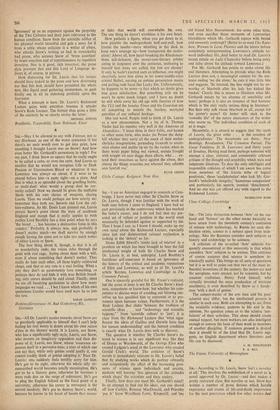SIR,—The false distinction between 'Arts' on the one hand and
'Science' on the other seems basically to have arisen from the twentieth century's confusion of science with technology. In Russia no such dis- tinction exists, science is a subject apart from tech- nology. Also the Russians consider such subjects as history and archeology to' be sciences.
A criticism of the so-called 'Arts' subjects fre- quently encountered at this university is that which considers 'Arts' subjects to be useless. This criticism of course assumes that science is somehow in- trinsically useful. This brings up all sorts of questions but it is as well to point out that two of the most in- fluential inventions of the century, the motor-car and the aeroplane, were created, not by scientists, but by amateur craftsmen. Henry Ford himself, who virtually invented the mass production of intricate machinery, is even described by Snow as a handy- man 'with a dash of genius.'
The subject-matter of the arts man and the pure scientist may differ, but the intellectual process is similar in each case. Both are attempting to see, from the available evidence, patterns in life and in the universe. No question arises as to the relative 'use- fulness' of their activities. This alone should create mutual respect, but most workers are also intelligent enough to convey the basis of their work to members of another discipline. If common ground is desired then it should be of the kind that Dr. Leavis sug- gests, an English department where literature ,and life can be discussed.
A. M. MIMARDIERE P. A. BILL
The Union, University of Birmingham *


































 Previous page
Previous page